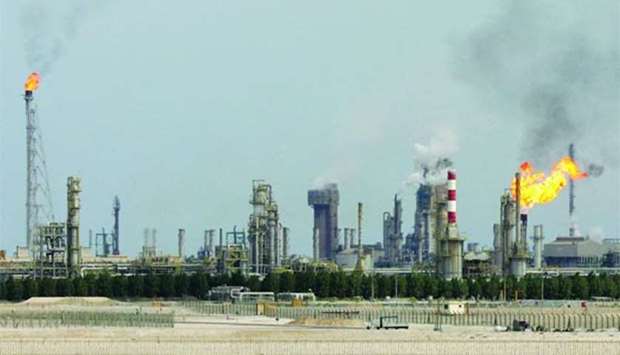The Qatari economy and financial markets are "adjusting to the impact" of the Gulf diplomatic rift after the initial shock of the June 5 measures, the International Monetary Fund said in its ‘Regional Economic Outlook’ released on Tuesday.
The diplomatic rift between Qatar and four Arab countries is expected to have a “limited impact” on growth in the region at this stage, the IMF said but noted that "a protracted rift could weaken medium-term growth prospects, not only for Qatar but also for other GCC countries."
The initial concern that trade disruptions could affect the implementation of key infrastructure projects has been mitigated by the availability of an inventory of construction materials and of alternative, and competitive, sources of imports, the fund said.
In addition, Qatar is accelerating efforts to further diversify sources of imports and external financing, and to enhance domestic food processing. Some trade has been re-routed through Kuwait and Oman, and alternative food supply sources have been established, allaying fears of potential shortages.
“Some financial pressures have emerged,” the IMF noted and said the downgrade of Qatar’s sovereign credit rating and outlook has raised interbank interest rates, and private sector deposits (both resident and non-resident) have declined.
But it said “liabilities to foreign banks” have also fallen. The impact on banks’ balance sheets has thus far been mitigated by liquidity injections by the Qatar Central Bank and increased public sector deposits. Banks are proactively focusing on securing additional long-term funding for their operations.
The economic impact in the rest of the region, including in the Gulf Cooperation Council (GCC) countries, appears to have been muted thus far.
Qatar’s exports to these countries have been broadly maintained, including large volumes of gas supplied to Oman and the UAE, IMF said.
“Reactions in GCC financial markets have also been benign, with initial spillovers rapidly dissipating. Over the longer term, a protracted rift could slow progress toward greater GCC integration and cause a broader erosion of confidence, reducing investment and growth and increasing funding costs in Qatar and the rest of the GCC,” the IMF said.
Among (GCC) members, the IMF projected the overall growth to bottom out at about 0.5% in 2017 as the Opec-led deal reduces oil output.
In contrast, non-oil growth is expected to recover to about 2.6% in 2017-18 as fiscal consolidation, which has weighed significantly on growth over the past couple of years, generally slows.
Nevertheless, the projections for both oil and non-oil growth are slightly weaker than the projections in IMF’s Regional Economic Outlook of May.
Low oil prices are also expected to dampen medium-term growth — GCC non-oil growth is projected to be modest at 3.4% in 2022, about half of the 6.7% of 2000-15.
GCC countries with larger buffers are adjusting their fiscal positions gradually. This is allowing them to keep non-oil growth broadly steady, the IMF said.
The initial concern that trade disruptions could affect the implementation of key infrastructure projects has been mitigated by the availability of an inventory of construction materials and of alternative, and competitive, sources of imports, the fund said.
In addition, Qatar is accelerating efforts to further diversify sources of imports and external financing, and to enhance domestic food processing. Some trade has been re-routed through Kuwait and Oman, and alternative food supply sources have been established, allaying fears of potential shortages.
“Some financial pressures have emerged,” the IMF noted and said the downgrade of Qatar’s sovereign credit rating and outlook has raised interbank interest rates, and private sector deposits (both resident and non-resident) have declined.
But it said “liabilities to foreign banks” have also fallen. The impact on banks’ balance sheets has thus far been mitigated by liquidity injections by the Qatar Central Bank and increased public sector deposits. Banks are proactively focusing on securing additional long-term funding for their operations.
The economic impact in the rest of the region, including in the Gulf Cooperation Council (GCC) countries, appears to have been muted thus far.
Qatar’s exports to these countries have been broadly maintained, including large volumes of gas supplied to Oman and the UAE, IMF said.
“Reactions in GCC financial markets have also been benign, with initial spillovers rapidly dissipating. Over the longer term, a protracted rift could slow progress toward greater GCC integration and cause a broader erosion of confidence, reducing investment and growth and increasing funding costs in Qatar and the rest of the GCC,” the IMF said.
Among (GCC) members, the IMF projected the overall growth to bottom out at about 0.5% in 2017 as the Opec-led deal reduces oil output.
In contrast, non-oil growth is expected to recover to about 2.6% in 2017-18 as fiscal consolidation, which has weighed significantly on growth over the past couple of years, generally slows.
Nevertheless, the projections for both oil and non-oil growth are slightly weaker than the projections in IMF’s Regional Economic Outlook of May.
Low oil prices are also expected to dampen medium-term growth — GCC non-oil growth is projected to be modest at 3.4% in 2022, about half of the 6.7% of 2000-15.
GCC countries with larger buffers are adjusting their fiscal positions gradually. This is allowing them to keep non-oil growth broadly steady, the IMF said.


